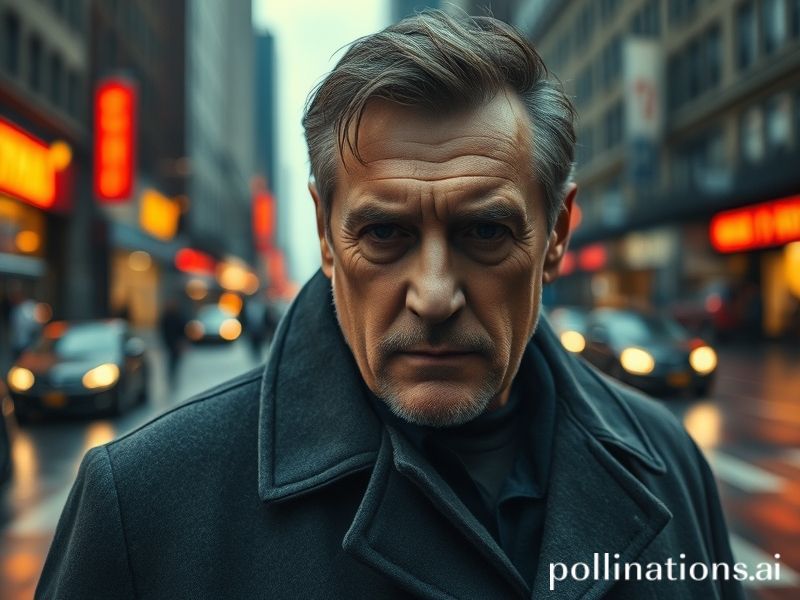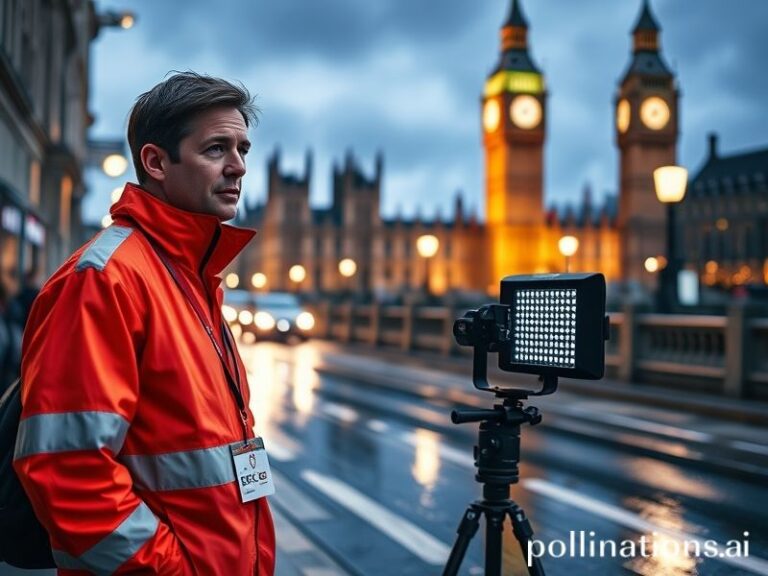Liam Neeson: The Last Global Superpower Standing Between Us and Chaos
BELFAST, NORTHERN IRELAND — Somewhere between the Black Forest and the Black Sea, a pension-age Irishman is still being asked to kidnap Europe’s collective anxieties and ransom them back in ninety-minute installments. Liam Neeson—Ballymena’s most famous export since guilt—has become a walking Rorschach test for a planet that can’t decide whether it wants to be rescued or left to rot in its own geopolitical trunk.
In Seoul subway ads, his craggy visage looms over commuters who’ve never seen a “Taken” film yet instantly recognize the universal grammar of righteous mayhem. German tabloids run side-by-side photos of Neeson and the latest Russian convoy, daring readers to spot the difference between Hollywood deterrence and NATO’s. Meanwhile, in Lagos, bootleg DVDs label him “The Oyinbo with Particular Skills,” a phrase that has entered pidgin as shorthand for any foreign intervention promising order but delivering collateral damage in 5.1 surround sound.
It’s tempting to dismiss the Neeson Industrial Complex as late-stage capitalism’s answer to grief counseling: outsource your trauma to a brooding 6’4″ Celtsman who will punch it into submission. But the numbers refuse to cooperate with our cynicism. “Taken 3” out-grossed France’s entire annual film subsidy budget; the franchise’s box-office haul now rivals the GDP of Fiji. Somewhere in the Pacific, a cabinet minister is wondering if applying for EU candidacy might be less humiliating than admitting Liam Neeson could buy their economy twice over with his back-end points.
The joke, of course, is on us. Neeson never asked to become the patron saint of Western impotence; he was busy doing Chekhov in Dublin when the War on Terror subcontracted its revenge fantasies to a man whose most intimidating prior role had been voicing a computer-animated lion. Yet each time he growls “I will find you,” half the world hears a promise, the other half a threat, and Brussels hears the sound of another cultural export slipping through its regulatory net.
Critics in Madrid argue that Neeson’s late-career pivot mirrors Europe’s own lurch toward muscular nationalism: soft power got mugged in an alley, so now we fetishize the guy who kicks the mugger’s teeth in while quoting the Geneva Conventions between roundhouse kicks. Others in Buenos Aires note the sheer efficiency of the model—why spend decades building institutions when you can hire a single septuagenarian to kneecap corruption in under two hours, post-credits scene optional?
The pandemic only turbocharged this strange soft-power diplomacy. Locked-down Italians binge-watched “The Marksman” like it was a civic duty; Polish border guards reportedly used “Non-Stop” as a training video for spotting smugglers, proving once again that art interpretation is where context goes to die. Even the Taliban, not known for their cinema studies curriculum, circulated clips of “Taken” on encrypted apps—either as cautionary tale or recruitment ad, analysts can’t quite decide.
Now, as COP conferences falter and supply chains snap like cheap bungee cords, Neeson’s latest project—an eco-thriller where he avenges a melting glacier—feels less like entertainment than emergency legislation. The trailer dropped the same week the Rhine ran dry; within 48 hours, #ParticularSkillsForThePlanet was trending above #ClimateJustice. The irony is so thick you could pave a motorway with it, assuming the asphalt doesn’t liquefy first.
And still he lumbers on, passport in hand, ready to punch oligarchs, cartels, or the occasional abstract concept. Because in a world where multilateralism wheezes like a dying VHS player, the fantasy of one righteous man with nothing to lose remains the last universally translatable language. We may not agree on carbon tariffs, but we all understand the visceral poetry of a well-placed head-butt.
So here’s to Liam Neeson: accidental geopolitical consultant, last action hero of the post-rules order, and living proof that globalization’s true lingua franca isn’t English—it’s righteous, beautifully choreographed violence delivered in a reassuring Northern Irish baritone. When the history of our era is written, scholars will note that while institutions crumbled and ice caps wept, humanity chose to soothe itself with visions of a 70-year-old man drop-kicking human traffickers into moral clarity.
In other words, we didn’t lose our innocence; we franchised it.







